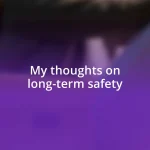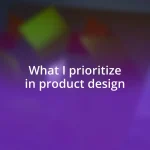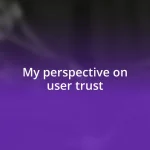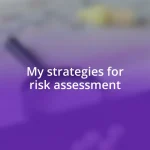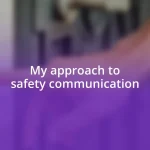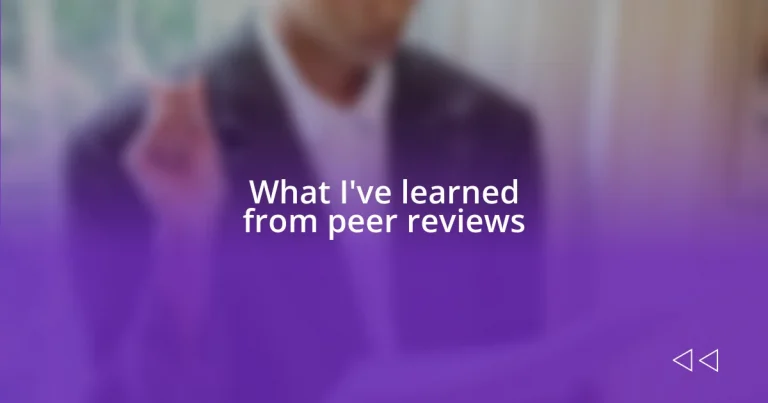Key takeaways:
- Peer reviews provide valuable diverse perspectives, enhancing understanding and pushing individuals beyond their comfort zones.
- Constructive feedback is essential for personal growth, improving clarity, fostering innovation, and strengthening relationships.
- Building collaborative relationships through open dialogue transforms feedback into a shared journey, enhancing both work quality and interpersonal connections.
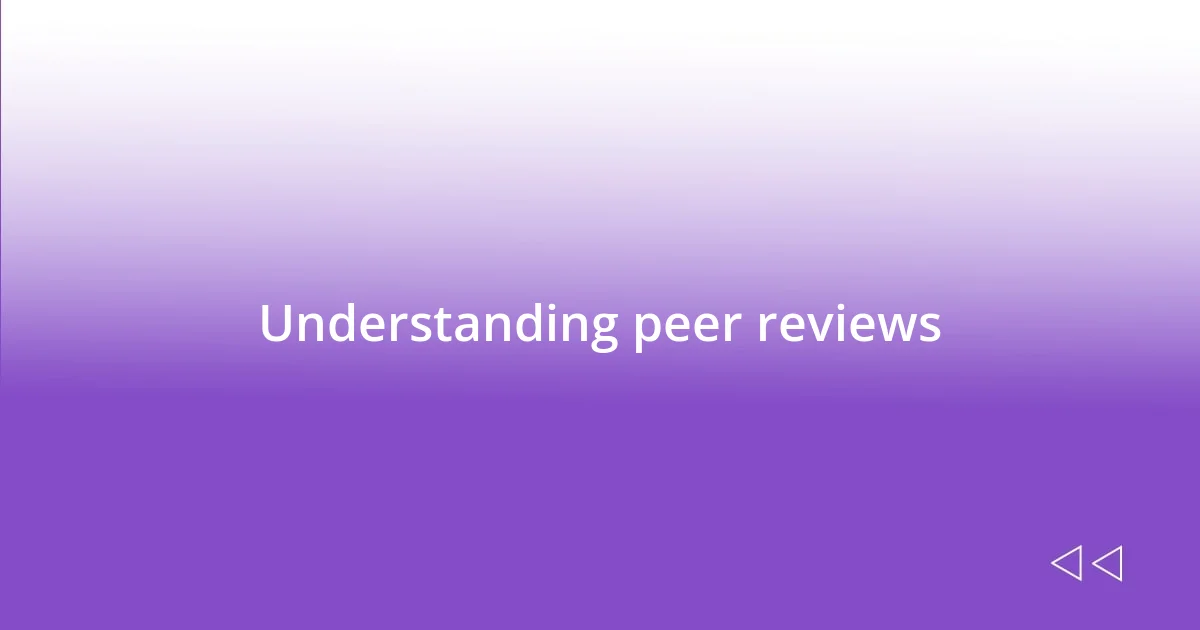
Understanding peer reviews
Peer reviews are essentially an opportunity for growth, allowing us to receive constructive feedback from others in our field. I remember the first time I submitted my work for peer review; the anticipation mixed with anxiety was palpable. It felt like standing on a cliff, unsure if I would soar or fall—but in hindsight, it was the best leap I could have taken.
One aspect of peer reviews that stands out to me is the value of diverse perspectives. Engaging with colleagues who approach a subject from different angles enriched my understanding of the material, making me question my assumptions. Have you ever found that a simple critique can open new doors of thought and creativity? I certainly have, and it’s invigorating to think about how feedback can push us beyond our comfort zones.
These exchanges can be emotionally charged, often eliciting a desire for validation or fear of judgment. However, I’ve learned to embrace that vulnerability as part of the process. Each comment, whether positive or constructive, is a gift wrapped in a unique viewpoint, shaping my work in ways I hadn’t anticipated. Isn’t it fascinating how this collaborative effort can transform our ideas and strengthen our resolve?
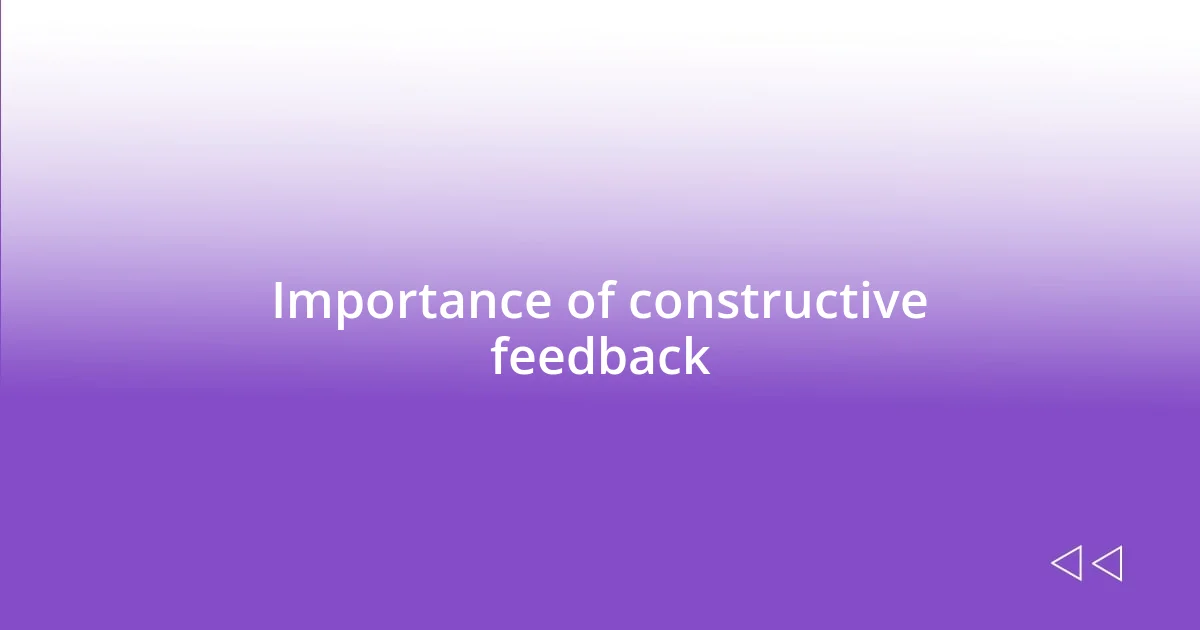
Importance of constructive feedback
Constructive feedback is the heart of personal and professional development. I vividly recall a moment when a peer pointed out a crucial flaw in my argument during a review session. At first, I felt defensive, but then I realized that their insights were not a personal attack. Instead, they were an opportunity for me to refine my ideas and elevate my work to a new level. It’s those challenging comments that can truly ignite our growth.
Here’s why constructive feedback is essential:
- Enhances clarity: It helps clarify confusing points that you might have overlooked.
- Encourages innovation: New suggestions can inspire creative alternatives you hadn’t considered.
- Builds confidence: Positive reinforcement alongside constructive criticism fosters a healthy self-assessment.
- Strengthens relationships: Engaging in feedback conversations can solidify connections with colleagues and peers.
- Promotes continuous learning: It creates an atmosphere where learning is ongoing and everyone benefits.
Reflecting on these aspects, I realize that without constructive feedback, my journey would have been far less enriching. It’s a powerful tool that refines not just our projects, but also our ability to adapt and innovate.
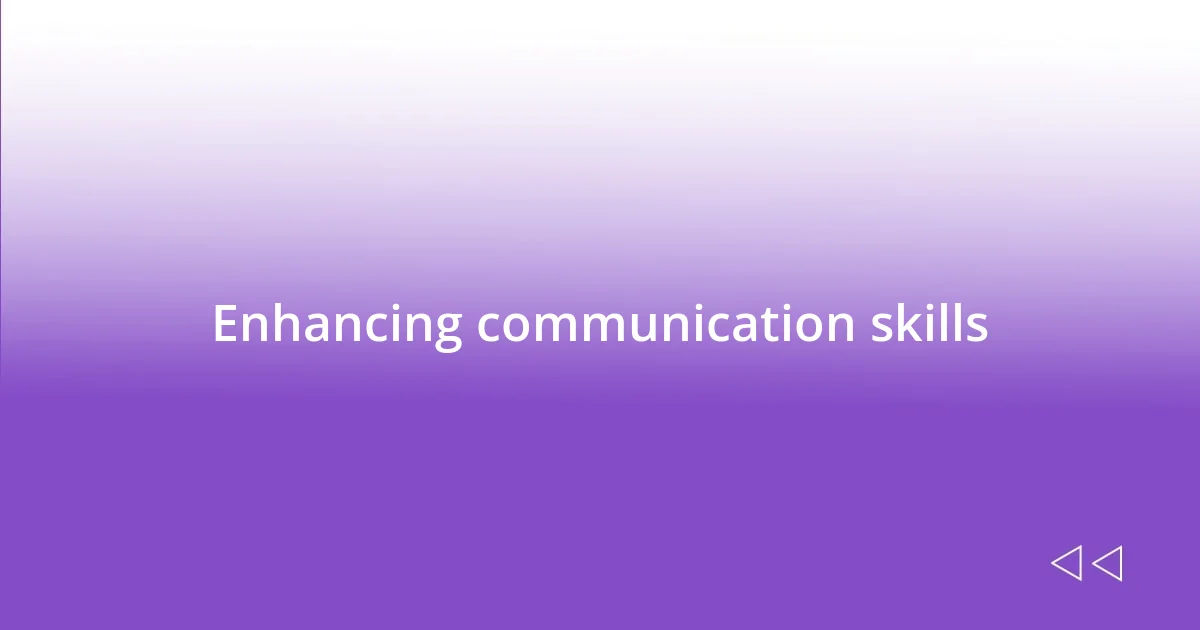
Enhancing communication skills
When I think about how peer reviews have boosted my communication skills, I can’t help but smile. For instance, there was a time when I struggled to articulate my ideas clearly. During one particularly candid review session, a peer suggested I simplify my language for broader accessibility. Initially, it stung a bit, but it hit me later that simplifying complex ideas actually makes them stronger. Now, I focus on clarity, ensuring my message resonates with a diverse audience, which has drastically improved my communication.
One thing enduring about feedback is that it forces you to listen actively. In the beginning, I’d often be mentally preparing my rebuttal while someone was sharing their thoughts. Engaging in peer reviews shifted that mindset; I learned to pause, absorb, and genuinely consider the feedback given. This approach not only improved my listening skills but also helped me develop empathy toward others’ perspectives. Have you noticed how listening can sometimes be more impactful than speaking?
Finally, I realized that peer reviews demand a certain level of humility. Sharing your work and anticipating critique requires vulnerability, which, while daunting, ultimately enhances your ability to communicate. On one occasion, I received feedback that completely changed the direction of my project. This taught me that embracing constructive criticism leads to profound growth and a deeper connection with my audience. It’s fascinating how sharing openly can lead to richer dialogues and clearer communication.
| Aspect | Impact on Communication Skills |
|---|---|
| Listening | Improved active listening and empathy by learning to absorb feedback fully. |
| Clarity | Encouraged simplifying complex ideas, making them more accessible to a broader audience. |
| Vulnerability | Fostered humility, leading to deeper connections and richer dialogues. |
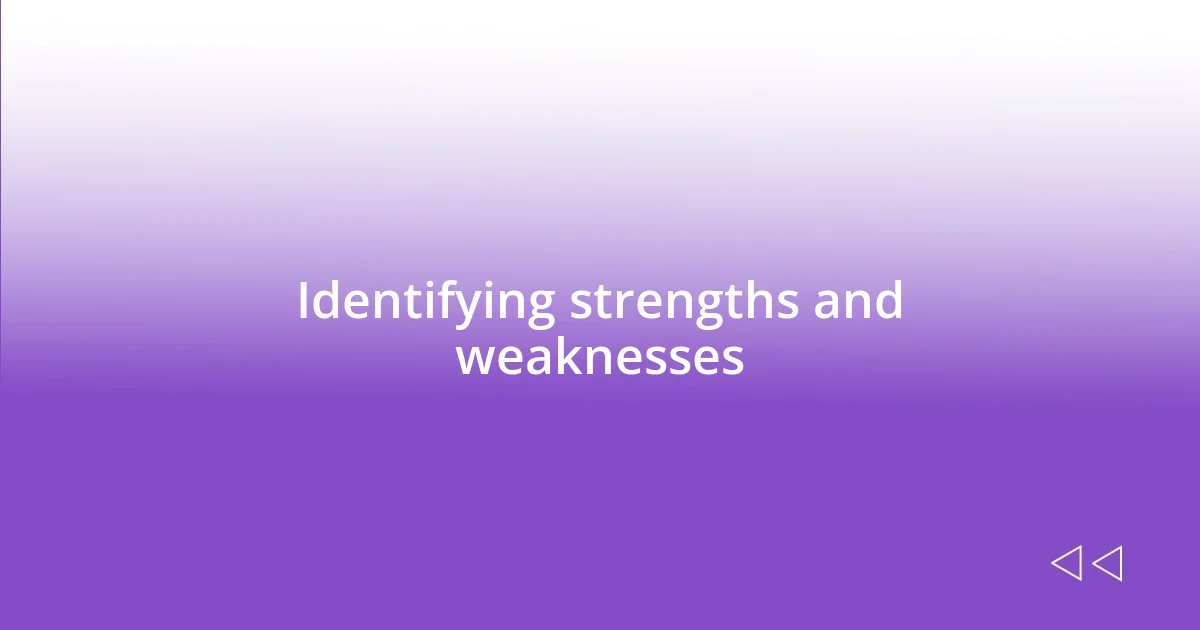
Identifying strengths and weaknesses
Identifying strengths and weaknesses is a crucial aspect of peer reviews, and I’ve experienced this firsthand. When I received feedback pointing out my tendency to go off on tangents, it was like a light bulb moment. I hadn’t realized that my excitement could sometimes cloud my focus. This insight not only helped me streamline my arguments but also allowed me to appreciate the strength of precise communication. Have you ever found that your enthusiasm might be leading you astray?
On another occasion, a peer highlighted the effectiveness of my conclusions but noted that my analyses often lacked depth. Initially, I felt a wave of disappointment. However, this valuable criticism pushed me to dig deeper into my research and arguments. The journey of refining my work has been enlightening, turning my weaknesses into a newfound appreciation for thoroughness. It’s incredible how acknowledging our flaws can transform them into areas of strength, don’t you think?
Through these experiences, I’ve come to realize that recognizing our strengths alongside our weaknesses is a powerful practice. It builds a more rounded perspective that fuels growth. For instance, understanding where I excel in engaging storytelling has motivated me to enhance my analytical skills. This balance between strengths and weaknesses not only boosts my confidence but enhances the overall quality of my work. Isn’t it fascinating how such insights can sculpt our paths forward?
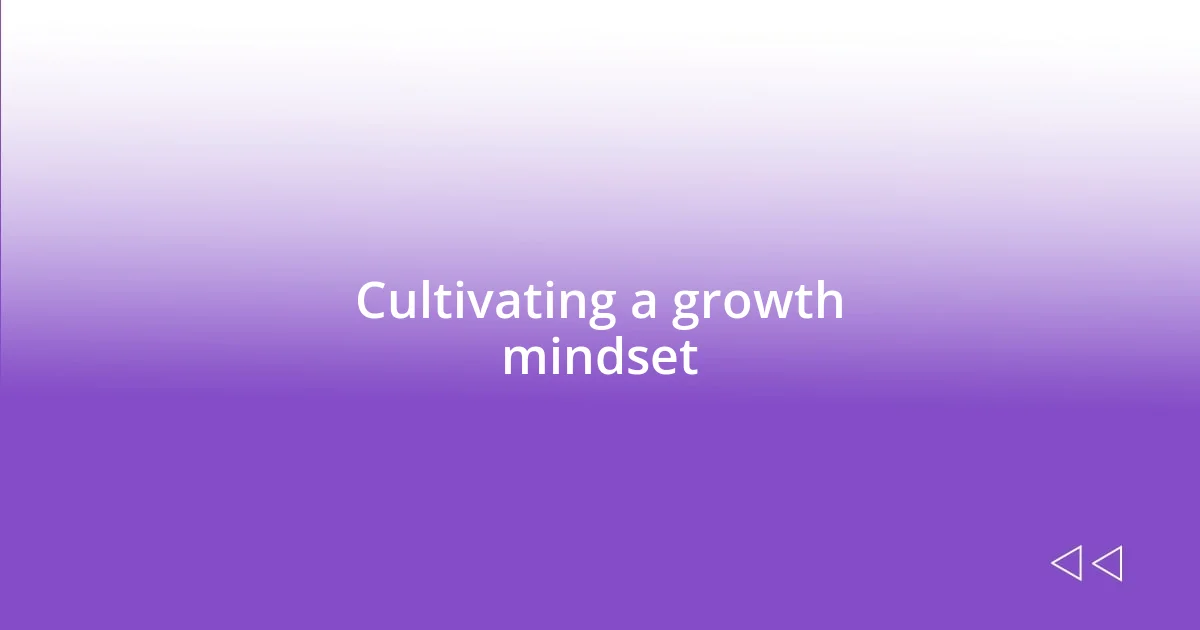
Cultivating a growth mindset
Cultivating a growth mindset is at the heart of my learning journey through peer reviews. I remember a time when I received feedback on a project that challenged my entire approach. Initially, I felt defensive and discouraged, thinking, “How can they possibly understand my vision?” But as I sat with that feedback, it dawned on me that this was a chance to stretch beyond my comfort zone. Embracing that moment made me realize that growth comes from the willingness to adjust and learn.
I often find that a genuine growth mindset revolves around seeing challenges as opportunities rather than obstacles. For instance, after a particularly tough review session, I began keeping a journal of feedback. I tracked how I felt in response, and over time, I noticed a shift. I started looking forward to reviews, eager to unearth insights hidden beneath my initial reactions. Have you ever turned a moment of frustration into a spark for creativity? That’s exactly what happened for me.
Furthermore, having a growth mindset means understanding that failure is not the end but a stepping stone. There was a presentation where nothing seemed to go right. The feedback was harsh, and my first instinct was to retreat. Instead, I took time to analyze what went wrong. This process reignited my passion and dedication, leading me to develop a more resilient approach to my work. It became clear to me that every setback can fuel future success. How often do we let one little stumble define our entire journey? In my experience, it’s the reflection and adaptation that truly matter.
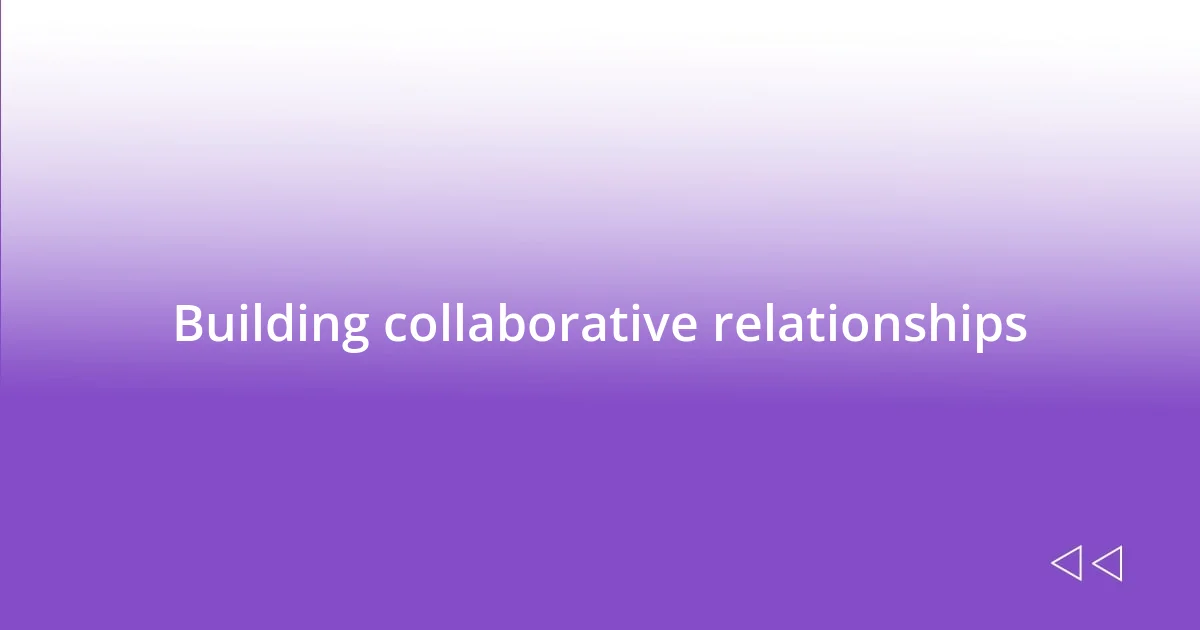
Building collaborative relationships
Building collaborative relationships fundamentally transforms the way we approach feedback. I remember the first time I reached out to a colleague for a peer review; I was nervous but also excited. As we discussed our projects, I found that sharing insights with someone who understood my challenges created an atmosphere of trust. Did you know that collaboration can give birth to ideas we never considered? That realization was a game-changer for me.
I’ve also learned that vulnerability plays a significant role in collaboration. Once, during a review, I hesitated to share my uncertainty about certain aspects of my work. When I finally opened up, my peer responded with understanding and advice that genuinely shaped my approach. It hit me how essential it is to create a space where we feel safe to express not just our strengths but our doubts too. Have you ever found that by sharing your fears, others are more willing to collaborate effectively?
In building these collaborative relationships, I’ve seen firsthand how feedback transforms through an open dialogue. One project stands out: I integrated comments from a peer throughout the process instead of just at the end. The back-and-forth exchange not only improved my work but also fostered a sense of camaraderie. This connection made our collaborative effort feel like a shared journey rather than isolated tasks. Isn’t it fascinating how collaboration can evolve our work and relationships simultaneously?
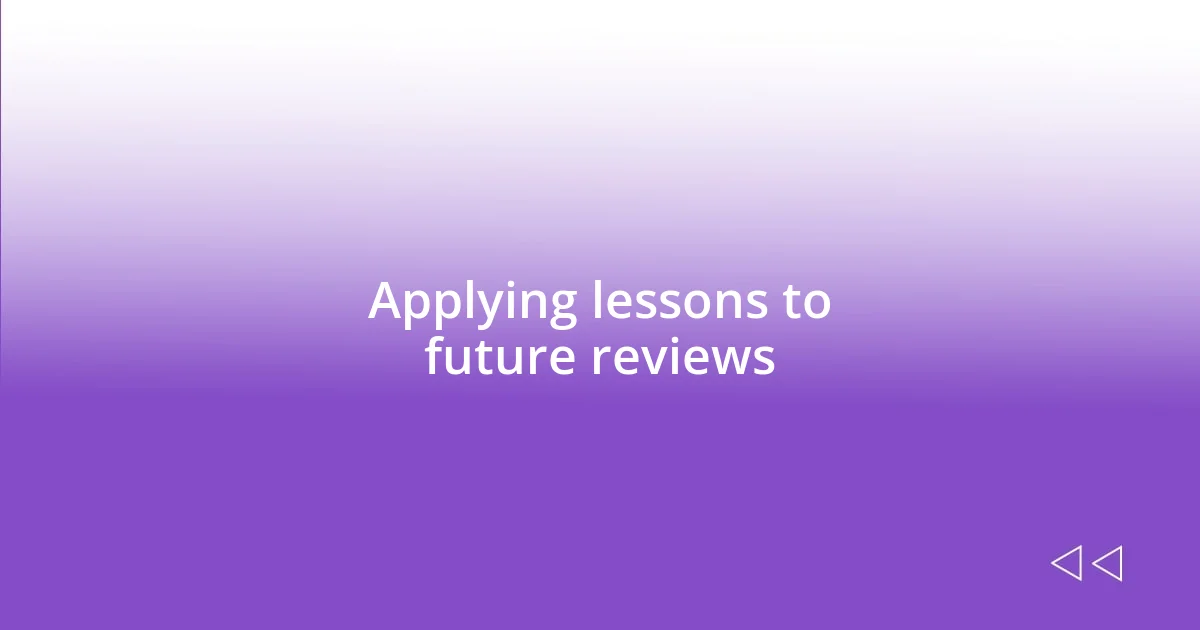
Applying lessons to future reviews
The lessons I’ve learned from peer reviews significantly shape my approach to future evaluations. For example, I once took part in a review where my work was critiqued for being too comprehensive, even overwhelming. It struck me then that clarity is just as important as thoroughness. Now, I consciously work to streamline my presentations, making sure to highlight key points without burying them in details. Has this happened to you, where you realized a simple change made all the difference?
One profound takeaway for me has been the power of preparation. After a review where I felt unprepared and caught off guard by questions, I adopted a more structured approach to my submissions. I now create a pre-review checklist, including potential areas of concern and responses I’ve prepared in advance. This tactic has not only boosted my confidence but has also transformed my reviews into productive conversations. Isn’t it remarkable how a little foresight can turn uncertainty into dialogue?
Additionally, I’ve gained a renewed appreciation for timely feedback. There was an instance when I waited too long to share my work for review, which led to rushed comments that didn’t capture the essence of my efforts. Since then, I’ve been proactive about seeking out peers early in my projects. I find that asking for insights at different stages not only refines my project but also cultivates ongoing communication. Imagine how much richer our work could be if we embraced feedback as a continuous journey rather than a one-time checkpoint!



